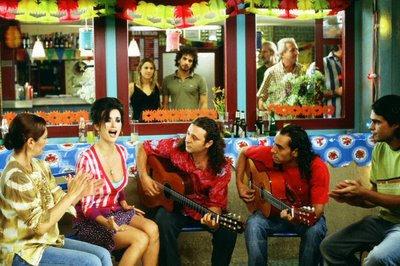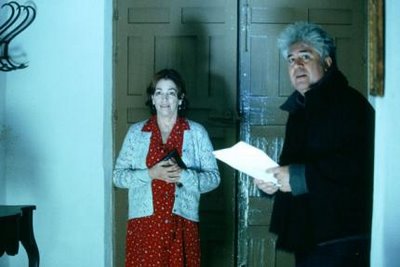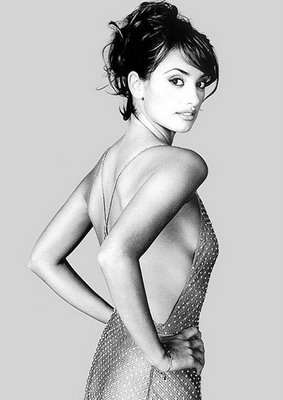 Penélope Cruz in Volver, directed by Pedro Almodóvar, 2006 |
The heart of the movie is in a small village of credulous provincials in La Mancha, the natal region of both Don Quixote and Pedro Almodóvar. Two sisters, Raimunda (Penélope Cruz) and Soledad (Lola Dueñas), travel back and forth between their new homes in Madrid and that little town, later identified as Alcanfor de Las Infantas, the town in Spain with the highest rate of insanity among its inhabitants. The village is fictional (it was actually shot in a place called Almagro, near where Almodóvar himself was born), but the region is indeed arid and windswept, and as often happens where there are sinister winds, fires and madness do abound in La Mancha. The frequent shots of wind turbines, generating electricity, again recall the ingenioso hidalgo of Cervantes, who mistook the 16th-century predecessors of these modern windmills for giants.
 Carmen Maura and Pedro Almodóvar, on the set of Volver |
 In recent movies, Almodóvar has become obsessed with the mechanics of death and grief (the disturbing, surreal Hable con ella) and the righting of past wrongs (La Mala educación and Todo sobre mi madre). Both themes figure prominently in Volver, but in a way that is both more gentle and more powerful than any of these previous films. The movie is beautifully and lovingly shot (cinematography by José Luis Alcaine), both the beauty of the village and the squalor of Madrid. The opening scene of women cleaning sepulchers in the cemetery, including women who are tending their own graves for when they die, and a spectacular close-up of paper towels soaking up blood are memorable.
In recent movies, Almodóvar has become obsessed with the mechanics of death and grief (the disturbing, surreal Hable con ella) and the righting of past wrongs (La Mala educación and Todo sobre mi madre). Both themes figure prominently in Volver, but in a way that is both more gentle and more powerful than any of these previous films. The movie is beautifully and lovingly shot (cinematography by José Luis Alcaine), both the beauty of the village and the squalor of Madrid. The opening scene of women cleaning sepulchers in the cemetery, including women who are tending their own graves for when they die, and a spectacular close-up of paper towels soaking up blood are memorable.Desson Thomson, Pleasure Cruz (Washington Post, December 22) A. O. Scott, The Darkest of Troubles in the Brightest of Colors (New York Times, November 3) Rob Nelson, The Man Who Loved Women (The Village Voice, October 31) Peter Bradshaw, Volver (The Guardian, August 25) Thomas Sotinel, "Volver" : les meilleurs des mondes selon Pedro Almodovar (Le Monde, May 20) Jean-Luc Wachthausen, Interview with Penélope Cruz: « J’ai l’ambition du bonheur » (Le Figaro, May 17) |
Penélope Cruz has not impressed when acting in English, but her seductive and innocent beauty come across better when she has the added comfort of acting in her native language. After her early appearance as the sweet and guileless Luz in Belle époque (1992), the recent partnership with Almodóvar has yielded some of her best work, in Todo sobre mi madre and Carne trémula. In this lead, she shines beyond what we might have expected from previous roles. Here she is aged beyond her years especially by the use of a butt prosthesis, something she discussed in an interview with NPR. As you will surely agree, on the basis of the image shown here, this is a terrible crime against the female form. For a gay man, Almodóvar has always been obsessed with women's bodies, and this is again a prominent part of Volver. At one point, an overhead shot of Cruz, with her cleavage in full relief, provoked male sighs all around the theater. Cruz's performance is the main reason to see Volver.
No comments:
Post a Comment